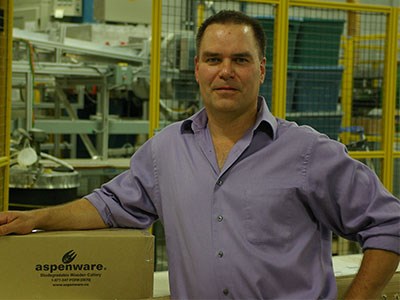A British Columbia manufacturer of wooden cutlery that once dallied with establishing a factory in northwestern Ontario is back again.
Aspenware, an award-winning Vernon, B.C. manufacturer, is developing a nationwide fibre supply chain starting with a veneering operation at the Wabauskang First Nation, between Dryden and Red Lake.
The company has a patented manufacturing process for the production of compostable wooden cutlery. It's promoted as an alternative to the disposable plastic utensils.
The Wabauskang operation is one of a number of irons in the fire for Aspenware president, Terry Bigsby, a former high school shop teacher-turned-entrepreneur, who has sky-is-the-limit plans to supply both the retail and wholesale markets internationally.
“It's coming along nicely,” said Bigsby,who left teaching in 2004 to concentrate his efforts on his startup company. “It's taken a while but we had to perfect the technology.”
The utensil is a laminated two-ply piece of veneer bonded with an edible adhesive. The product is considered so revolutionary, Bigsby received a Manning Innovation Award last October.
At Wabauskang, Aspenware has contracted Doug Riffle, a local First Nation harvester, to supply him with 100 cubic metres of veneer a month.
“I buy the veneer from Doug, ready to go in my machine. He's sourcing the fibre, he's logging it, veneering it, and handling it all.”
Riffle was unavailable for comment but Bigsby said he's building a value-added operation with a sawmill that could employ as many as 150, roughly 80 per cent of the employable people on the reserve.
“He's putting together a nice business that incorporates all aspects of fibre and we happen to be a core component of that.”
Bigsby said once the Wabauskang operation is running smoothly, there are plans to roll out to other First Nation communities, namely Grassy Narrows, Lac Seul and Nipigon.
In the near future, Bigsby didn't rule out establishing cutlery plants in northwestern Ontario.
“We're looking at multiple facilities with multiple lines in each plant, running around the clock.” Aspenware's strategy is to make utensils from underutilized species of birch and aspen fibre which is harvested by First Nations-owned businesses in Ontario, B.C. and the Prairie provinces. Feeding him the contacts is his Ontario partner, Dr. Michael Dan, president of Regulus Investments and Gemini Power Corp., who has been working with Aboriginal communities for several years to establish hydro power facilities.
“This is another step toward helping them economically,” said Bigsby. “The cool thing is they don't have to drive two hours to go to work. It's right in their backyard, it's sustainable, there's low infrastructure, operating and capital costs.”
Three years ago, Aspenware was the talk of the town in Dryden. The company was scoping out the area with intentions on building a 50,000-squarefoot cutlery factory in an industrial park.
But Aspenware mysteriously elected to delay its Ontario expansion, choosing instead to focus on refining a next- generation production line in B.C., which is now operational.
“It was a timing issue on everybody's part,” said Bigsby. “I'll leave it just like that. Though it's taken years to perfect the process, Aspenware's Okanagan Valley plant today is a 25,000-square-foot plant with a fully automated next generation production line which can make 20,000 pieces per hour.
Aspenware's primary market is British Columbia and the U.S. where they ship into chain stores like Home Outfitters, Save-on- Food and Pharmasave.
While the product has huge potential, Bigsby is fixating on finetuning his raw material costs, which is why Ontario is so appealing.
“Ontario focuses on hardwoods and always has. B.C. doesn't. Here, we're an adjunct to the forestry industry which really creates trouble because the way our forest practices work is they have to get the same value as if it were a softwood. That's through the roof compared to Ontario. It's three to four times the dollar. So this works for everyone.
“That's why transportation (costs) doesn't really matter. A couple hundred pallets on a boxcar doesn't make any difference.”




